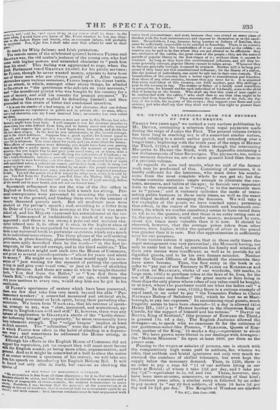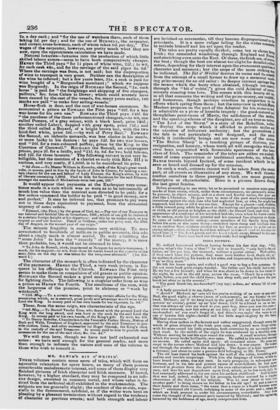MR. DEVON'S SELECTIONS PROM THE RECORDS OF THE EXCHEQUER.
NEARLY two years ago,* we noticed a very curious publication by Mr. DEVON, containing a selection from regal payments made during the reign of JAMES the First. The present volume (which has been long in reaching us) is of a somewhat similar nature, though relating to a much earlier period, and extending over a longer time; beginning with the tenth year of the reign of HENRY the Third, (1226,) and coming down through the intervening Monarchs to HENRY the Sixth, with an Appendix containing a few disbursements of later Sovereigns. The payments, too, unless our memory deceives us, are of a more general kind than those in tl e previous volume.
As regards its uses and merits, what we said of the former work may be predicated of this. Consisting of specimens, it is hardly sufficient for the historian, who must draw his conclu- sions from the most complete whole he can get at; but the volume contains materials ample enough to illustrate the cus- toms, manners, and habits of the age; to furnish very important facts to the economist as to "value," or to the mercantile man as to " prices ;" and it curiously indicates the mode of trans- acting public business in these early times, as well as the exact and frugal method of managing the finances. We will take a few examples of the points we have touched upon; premising that wheat, in the course of the thirteenth and fourteenth cen- turies, (to which we confine ourselves,) seems to have varied from 48. 6d. to 5s. the quarter, and that there is an entry rating oats at 2s. the quarter ; which would render money, measured by corn, about ten times more valuable than it is now. It should be observed, however, that the average prices taken from other sources, were higher, whilst the quantity of silver in the pound was greater than it is now. But this approximation is sufficiently near for our purposes. From various entries it appears, that in those early times the regal management was very patriarchal ; the Monarch having, not only in name but in deed, to maintain his family and relations if their own means were insufficient, as well as to provide for all dignified guests, and to be his own finance minister. Neither were the Great Officers of the Household the sinecurists they have since become. Thus, the first entry in the book is an order to "pay out of our Treasury to WALTER DE KIRKEHAM and WALTER DE BRACKLEY, clerks of our wardrobe, 200 marks, (a large sum, 6001.) to purchase robes at the fairs of St. Ives, for the use of RICHARD our brother:" the great marts or fairs being in those days the only places where robes of any value could be bought, or at least, where the purchaser could see what the ladies call " a variety." In the same year, (1226,) there is a curious example of royal need, in an order to pay " the Venerable Father in Christ RICHARD Bishop of Salisbury 1001., which he lent us at Marl- borough, to pay our expenses." In maintaining royal guests, much frugality seems to have been observed-11. a day is allowed (41st Henry III., 1257,) to " HENRY brother to the illustrious King of Castile, for the support of himself and his retinue." " DAVID ma ERUYS, King of Scotland," (the prisoner of EDWARD the Third,) is granted 138. 4d. a day. The English Justinian allowed the dowager—or, to speak with an exactness fit for the criticism of our gentleman-usher-like Premier, " ELEANOR, Queen of Eng- land, another of the King," 10 marks a day,—equivalent to about 301. We have grown more liberal in our dealings with dowagers : the "Reform Ministers" fix upon at least 3001. per diem as the proper sum. Passing to the wages or salaries of persons, one is struck with the comparatively high sums paid to soldiers, &c. whence we infer, that serfdom and brutal ignorance not only very much re- strained the numbers of skilled labourers, but even kept the supply below the necessary demand. Thus, in 1226, there is an order to pay a sum for " 11 of our soldiers living in our castle at Bristol; of whom 8 take 12d. per day, and 3 take per day 7 itl."—equivalent to 5s. 6d. and 10s. These, however, may have been men-at-arms, armourers, or something of that kind; for, fourteen years after, a similar entry is followed by an order to pay money to "our 20 foot soldiers, of whom 10 have 3d. per day and 10 30. per day." The Knights of Windsor are allowed
• No. 411; 2ith June 1834
2s. a day each ; and "for the use of watchers there, each of them taking 2d. per day ; and for the use of BURNELL, the carpenter, and certain cross-bowmen, each of whom takes Gd. per day," The wages of the carpenter, however. are pretty much what they are sow, upon the approximate calculation we have made. Natural luxuries—luxuries into the production of which little skilled labour enters—seem to have been comparatively cheaper. HENRY the Third pays "for 11 pipes of white wine, 22/.; to wit, for each cask 40s., and for the carriage of the said pipes 8s. Gd." Where the carriage was from, is not said; but the disproportion of wine to transport is very great. Neither can the description of the wine be inferred; but a few years later, 35s. a cask is paid for wine bought of a "Burgundian merchant ;" which we suppose was Burgundy. In the reign of RICHARD the Second, "5s. each bone" is paid for "the freightage and shipping of five chargers, palfreys," &c. from Calais to Dover ; which could scarcely have been caused by the cost of the vessels, for, many years earlier, 100 marks are paid "to make four tailing-vessels."
Horse-flesh is dear, and the cost of war-horses enormous. So economical a prince as EDWARD the First pays "801. for a bay war-horse for his own use." EDWARD the Third pays 210/. for "the purchase of the three undermentioned chargers,—to wit, one called Pomers, of a gray colour, with a black head, price 1901.; another called Labryt, dappled with gray spots, price 701.; and the third called a Bayard, of a bright brown bay, with the two bind-feet white, price 501.:—by writ of Privy Seal." EDWARD the Second, an imbecile monarch, was less choice in his steeds, or more lucky in his dealers : he pays 521. for two war• horses, and "201. for a roan.coloured palfrey, given by the King to the Countess of Cornwall." RICHARD the Second, an extravagant prince, pays 2/. for a bridle, and "211. 6s. 8d. for two bold falcons, and 121. for three lanerets." The following extract is not very in- telligible, but the mention of a chariot so early (6th Edw. III.) is curious, and very costly, if 1,0001. is to be considered its price.
6,3d June.—To Master William la Zousche, clerk of the King's great ward- robe, in money, paid to him by the hands of John le Charer, for making a cer- tain chariot for the use and behoof of Lady Eleanor, the King's sister, by writ of liberate containing 1,000/. Paid to him for furniture for the said Eleanor, amongst the mandates of Michaelmas term last past, 201."
It would appear that payments at the Exchequer were some- times made in a coin which was so worn as to be intrinsically of much less value than the nominal sum directed to be paid; for few orders command the holder to be paid " in good money, new and perfect." It may be inferred too, that promises to pay were not in those days equivalent to payment, from the occasional urgency of some orders.
" Edward, (the First,) by the grace of God, &c.—Pay out of our Treasury to our beloved and faithful Oto de Grandison, 100/., which of our gift he delivered to a certain foreign knight at his departure : and this by no means omit, as you reaped us and our honour. Dated at Odihatn, under our privy seal, the 30th day of August, in the second year of our reign."
The minute frugality is sometimes very striking. To ears accustomed to hundreds of millions in public accounts, this ado about a single mark is almost sordid. By only alinitting the " same John " to have the " custody " of the money, it is more than probable, too, it would not be returned to him.
" To John de Rowell, clerk, imprisoned at Newgate for certain trespasses, 1 mark, for kis support—to wit, from those 54 marks found in the custody of the same John on the day be was taken fur the trespasses aforesaid." (1st Ed- ward I.) The character of the monarch is often indicated by the character of the payments. HENRY the Third, a very weak prince, is fre- quent in his offerings to the Church. EDWARD the First only seems to make them on compulsion of old grants or public opinion. RICHARD the Second makes a good many payments to persons for fighting duels. The following is a singular order from so wise a prince as HENRY the Fourth. The smallness of the sum, with the largeness of the promise, point to alchemy or " work by witchcraft."
"1114 May. —To a certain woman, prosecuting certain affairs for the King, concerniog which, as is asserted, great profit and advantage would arise to the Lord the King. In money paid to her own hands for her expenses, 1s. 8d."
These, from the same reign, are characteristic of the age.
" Sth May. —To Bertolf Vander Eme, who fenced with the present Lord the King with the long sword, and was hurt in the neck by the said Lord the King. In money paid to his own bands, of the King's gift. By writ, &c. 10/. " To Henry Sowelby, Chamberlain to the Venerable Father Henry, Bishop of Bath and Wells, Treasurer of England, appointed by the said Treasurer to pro- vide clothes, linen, and other necessaries for Roger Stanlak, the King's idiot, in the custody of the said Treasurer. In money paid to him to provide such necessaries for the use of the said idiot, &c. las. 4d."
We will stop here, though we have not half exhausted our notes: we have said enough for the general reader, and more than enough to indicate the nature and uses of the volume to those who wish to consult it.



























 Previous page
Previous page